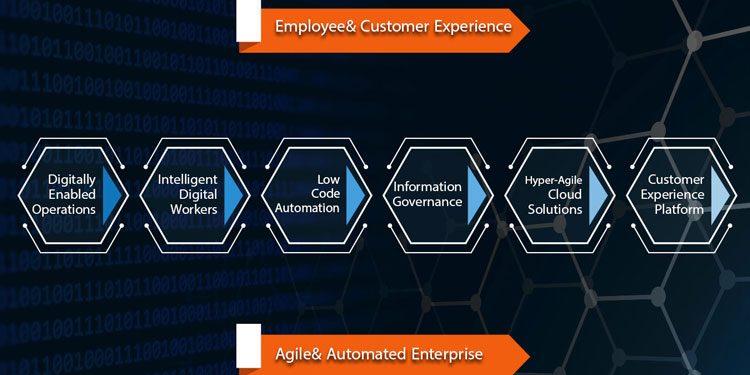
The current economic uncertainty that is impacted by COVID-19, has placed a strong emphasis on the fundamental principles of Efficiency, Accuracy and maximizing Capacity, as well as human intellect, in all types of working environments
In alignment with the IDC depicted 6 fundamental Digital Transformation Strategies for 2020 and beyond, at CompTechCo , we embrace these six strategies, and make sure that they form an integral part of our core DNA and Strategic Principle, in order to continuously enhance the value proposition that is delivered to our customers and partners. These 6 fundamental strategies are
- Digitally Enabled Operations: deliver digitally enhanced products and services that leverage information at scale; since its foundation in 2007, CompTechCo has transitioned from the era of ‘Archiving’ to “Enterprise Content Management’, to ‘e-Services’ , only to learn by experience, that the true benchmark for sustained organizational agility and digital transformation, is that of ‘Digitally Enabled Operations’, where organizations need to embrace Data Governance, leverage Data Modality , access and usage, coupled with real time actionable Analytics to drive better products, services and ultimately, customer experiences. A Data and Analytics driven culture should become the foundation for sustainable competitive advantage. CompTechCo has contributed in the delivery of best in class solutions and services in KSA, that have Digitally Enabled the core operations of many prestigious government organizations, such as the General Auditing Bureau, the Royal Commission of Jubail and Yanbu and the Saudi Post
- Intelligent Digital Workers: let’s face it, the notion of ‘Digital Transformation’ has been over-promised by many system integrators and leading technology vendors, and the actual delivery on this promise has fallen short, well below the expectations of organizations. Such unfortunate results have nothing to do with the competency of the system integrator, or the product portfolio of your typical ECM or ERP technology vendor, it is rather correlated to the concept of looking in the wrong direction! In order to digitally transform, you need digital processes, and for digital processes you need digital workers ! Digitally transformed organizations increasingly use intelligent automation capabilities, including intelligent capture, robotic process automation (RPA), and other “digital workers” in daily work. This maximizes the value of corporate information assets while augmenting the capabilities of human workers to deliver improved customer and employee experiences.
- Low Code Automation: Low code software is a key enabler of application creation — empowering organizations to simplify and speed their efforts to automate processes and manage information. Leveraging tools like visual development and point-and-click configuration, non-developers
can design and build low- to mid-complexity solutions that improve worker efficiency and further digital transformation initiatives. - Information Governance: Risks associated with the growing volume of data will make the storage, security, and access of information key focus areas in 2020 and beyond. Equipping organizations with visibility and transparency into organized data is required to manage information governance and to mitigate risks. Enterprises must specifically address data discovery and data minimization to support expanding compliance requirements and data privacy regulations.
- Hyper agile cloud solutions: Organizations embarking on the journey to become a digital enterprise will continue to increase investments in SaaS and cloud applications for greater agility, operational efficiency, and customer experience. By turning to pure cloud or hybrid environments, companies can accelerate modernization efforts and replace slow, legacy applications with hyper-agile and user-centric cloud solutions.
Customer Experience: With customer experience as a key driver of digital transformation initiatives, organizations will look to leverage customer data and intelligence capabilities to better understand key stakeholders and deliver personalized service. An omnichannel, AI-enabled customer experience management (CXM) platform that includes both data management and intelligence supports a customer-centric corporate strategy.